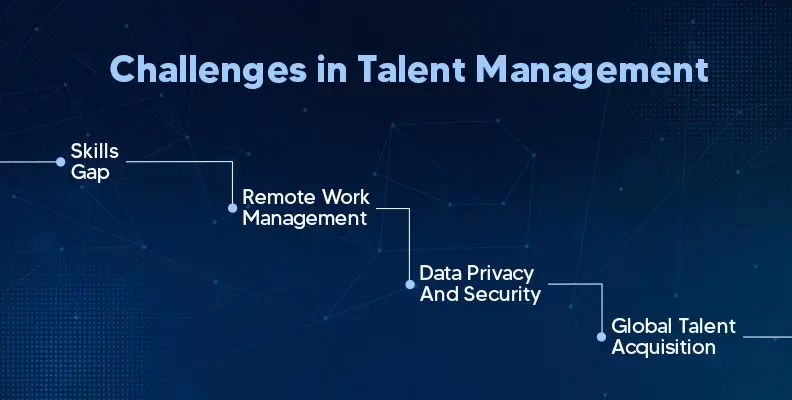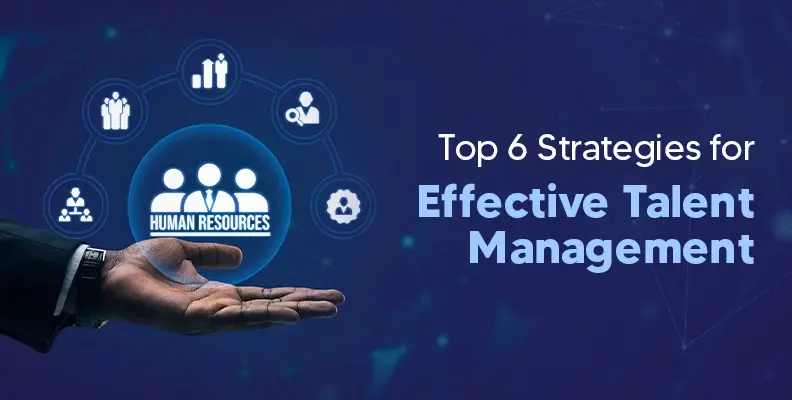Loading.....
Adapting to the Changing Landscape of Talent Management
In today's rapidly evolving business environment, talent management has undergone a significant transformation, driven by the digital age. Organizations are realizing that their greatest asset is their people, and effectively managing talent has become a critical factor for success. In this blog, we will explore the concept of talent management in the digital age, highlighting the key challenges and strategies that businesses must embrace to thrive in an era of constant change.
What is Talent Management

Talent management is a multifaceted approach to human resource management that plays a pivotal role in attracting, developing, and retaining the best talent within an organization. It encompasses a range of strategic HR activities that aim to optimize an organization's workforce. This includes talent acquisition, performance management, employee development, succession planning, and leadership cultivation.
Effective talent management begins with the recruitment and selection process, wherein organizations strive to bring in individuals with the skills, knowledge, and attributes that align with their goals and culture. Once talent is onboard, performance management processes come into play, which involve setting clear expectations, providing regular feedback, and rewarding exceptional contributions. Furthermore, talent development initiatives, such as training programs and mentorship opportunities, empower employees to continually enhance their skills and knowledge.
Changing Landscape of Talent Management
The changing landscape of talent management is a direct response to the evolving dynamics of the modern workforce. As we transition into the digital age, organizations are required to adopt innovative strategies to attract, retain, and nurture their most valuable asset: their employees. Here are some major changes in talent management:
- Data-Driven Decision-Making
- Remote and Flexible Work
- Skills Over Degrees
- Diversity and Inclusion
Thanks to digital technologies, businesses may now gather and examine enormous amounts of employee-related data. This data can inform decisions about recruitment, performance management, and career development, allowing for more precise and data-driven talent management strategies.
The concept of remote and flexible work refers to the ability of employees to work from a location of their choice, often outside the traditional office setting, and to have more control over their work hours. This shift has been greatly accelerated by the COVID-19 pandemic, which prompted organizations worldwide to adopt remote work arrangements as a means of ensuring business continuity while adhering to health and safety guidelines.
Competencies and abilities frequently take precedence over formal education. Many companies are moving their emphasis from hiring only based on degrees to evaluating candidates' skills, frequently through certifications and skills testing.
The increased awareness of the importance of diversity and inclusion in the workplace. Talent management now includes strategies to foster diversity, equity, and inclusion to create a more innovative and dynamic workforce.
Challenges in Talent Management

While the digital age offers numerous opportunities for more effective talent management, it also presents several challenges that organizations must address:
- Skills Gap: Rapid technological advancements mean that employees' skills can quickly become obsolete. Organizations must continually upskill and reskill their workforce to bridge the skills gap and remain competitive.
- Data Privacy and Security: Collecting and storing employee data can pose privacy and security risks. Companies must implement robust data protection measures to safeguard sensitive information.
- Remote Work Management: Managing a remote or hybrid workforce can be challenging, as it requires new approaches to communication, collaboration, and performance assessment.
- Global Talent Acquisition: With the ability to work from anywhere, organizations can tap into a global talent pool. However, this also means facing competition on a global scale when recruiting top talent.
Top 6 Strategies for Effective Talent Management

Effective talent management is crucial for any organization aiming to thrive in today's competitive business landscape. To achieve this, it's essential to employ strategies that attract, retain, and develop top talent. Here are the top 6 strategies for successful talent management that can boost your organization's success:
- Embrace Technology: Invest in digital tools and platforms for recruitment, performance management, learning and development, and employee engagement. These technologies can streamline processes, enhance data analysis, and improve communication.
- Continuous Learning: Encourage a culture of continuous learning and skill development. Provide employees with access to online courses, mentorship programs, and opportunities to gain new skills.
- Data Analytics: Leverage data analytics to gain insights into your workforce. Use predictive analytics to identify high-potential employees, forecast turnover, and tailor development plans.
- Flexible Work Policies: Develop flexible work policies that accommodate remote and hybrid work arrangements. Ensure that remote employees have access to the necessary tools and resources to succeed.
- Diversity and Inclusion Initiatives: Implement diversity and inclusion initiatives to create a more inclusive workplace. Foster a culture that values and respects differences among employees.
- Feedback and Communication: Establish clear channels for feedback and communication between employees and management. Regular check-ins and performance reviews, even in remote work settings, are essential.
Conclusion
Talent management in the digital age is a dynamic and evolving process that requires organizations to adapt to new technologies, changing workforce demographics, and evolving employee expectations. By embracing technology, fostering a culture of continuous learning, and prioritizing diversity and inclusion, businesses can position themselves to attract and retain top talent in an ever-changing landscape. Successful talent management is no longer a luxury but a necessity for organizations striving to thrive in the digital age
 Back to blog
Back to blog












